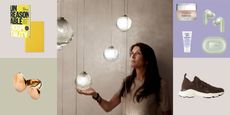'Poison Arrows' Are My Biggest Feng Shui Red Flag — Here's 5 That Could Be Throwing Off Your Home's Energy
In the eyes of any Feng Shui practitioner, poison arrows are as bad as they sound


As I continue my exploration into the world of Feng Shui, there's one term that I've heard plenty about that I'm still brings forth a question mark. And that is 'poison arrows'.
All I know is that, as per the principles of Feng Shui, poison arrows are not good for your home and should be avoided at all costs where possible. But how are we meant to avoid them without properly understanding what they are?
Well, I spoke to a couple of practitioners to truly uncover poison arrows and their common causes. Plus, you didn't think I'd leave you without their fixes, too!
What Are Poison Arrows in Feng Shui?

Disruptors of energy and violently pointy is what they are.
"In homes, a poison arrow typically refers to a strong corner that may be pointing directly at you," says Feng Shui expert Anjie Cho. "Like when you're sitting at your desk or sleeping in bed.
"Just like the head of an arrow, a strong corner or pointed structure directed at you, may be considered a poison arrow. Whether it's a part of your home's perimeter, architecture, or even your decor."
Although they aren't literal arrows, Feng Shui master Marie Diamond explains that they tend to direct harsh, attacking energy (known as sha chi) toward you or your environment.
"Poison arrows can subtly disrupt the harmonious flow of chi," she notes. "And over time, they may contribute to challenges like stress, poor health, relationship issues, financial stagnation, or simply a feeling of unease in your space."
Especially considering it's the year of the wood snake, there's absolutely no room for poison arrows in my home and yours. So here are some common causes to keep an eye out for.

Anjie Cho is an architect and Feng Shui educator from New York. She's been in the industry since 1999 and is now the co-founder of the Mindful Design Feng Shui School.

Marie Diamond is a world-renowned transformational leader, speaker, and global best-selling author. She is a Feng Shui master and star of the global phenomenon “The Secret”.
1. Sharp Corners

DO INSTEAD: Introduce curved corners for a more seamless flow.
According to Marie, one of the most frequent sources of poison arrows is sharp corners inside a home.
"When the edge of a wall, pillar, or piece of furniture points directly at where you sleep, sit, or work, it sends a stream of disruptive energy toward you," she says. "This can be particularly harmful when your bed or desk is in direct alignment with a sharp corner.
"The good news is that this can be softened by placing a tall plant or a faceted crystal near the corner to gently deflect the energy. Even fabric, art, or a small piece of furniture placed strategically can help."
Now, let's say you have too many sharp corners to count, I recommend starting with the rooms that have a major impact on your well-being. Since bedroom Feng Shui is of especially great importance, begin here.
2. Narrow Hallways

DO INSTEAD: Opt for segmented, spacious hallways like this.
Marie tells me that long, narrow hallways are another common culprit. And if that's not enough, claustrophobically lengthy hallways aren't a good look either.
"In Feng Shui, a straight corridor can act like a highway for energy, rushing through your home too quickly and creating an unsettling environment," she explains. "However, there are a number of easy fixes to help combat this poison arrow.
"To remedy this, you can place a rug along the hallway, hang crystals to slow the energy, or introduce artwork and soft lighting to break up the direct line and encourage a more gentle flow."
Although this isn't one of the more obvious interior trends that are bad Feng Shui, your home will definitely be better off without a long hallway, i.e., poison arrow central.
3. Triangular Roofing

DO INSTEAD: Go for sleek flat roofing.
Unfortunately, Marie points out that the architecture of your home itself may also be an unintentional cause of poison arrows.
"Triangular structures, sharp rooflines, or overly modern, angular designs can send pointed energy into your living spaces," she explains.
"If changing the structure isn’t possible, you can introduce balance by bringing in soft, rounded shapes in your decor. Think flowing curtains, curved furniture, and round mirrors or artwork."
So when it comes to flat vs pitched roof extensions, the former is better for your home in terms of both Feng Shui and design.
4. Exposed Ceiling Beams

DO INSTEAD: Prioritize smooth, paved ceilings without exposed ridges.
Back inside the home, Marie adds that exposed ceiling beams are another form of poison arrows.
"They create a downward energetic pressure that can lead to feelings of tension, fatigue, or heaviness," she says. "Especially if they’re situated above beds or desks.
"Solutions to remedy this kind of poison arrow include hanging bamboo flutes to symbolically lift the energy or draping fabric across the beams to soften their impact."
So if your home has exposed overhead beams on display, it might be time to dip into your ceiling decorating ideas to improve the flow of energy in each space.
5. Pointed Surroundings

DO INSTEAD: Indulge in a touch of landscaping and enjoy the privacy that comes with it.
"Outside your home, poison arrows can come from nearby buildings, fences, lamp posts," says Marie. "Or even sharp rooflines that point directly toward your front door or windows.
"These external features create energetic pressure that blocks the flow of positive chi from entering your space. A traditional Feng Shui cure for this is the Bagua mirror, which can be mounted above your front door to reflect or neutralize these incoming energies.
"Landscaping also plays a helpful role here. A hedge, a tall plant, or even a strategically placed decorative feature in your Feng Shui garden can act as a shield to soften and redirect harsh energy."
Smooth Decor to Avoid Poison Arrows

Color: Light Green
Not only is this LALA Reimagined Sculptural Oak Side Table from Anthropologie perfectly spring-coded, but it's also gorgeously curved and poison arrow-free. Plus, it's an extension of the colorful wood stain trend we now know and love.

Color: Dark Gray
When placed right, a mirror can do so much for the Feng Shui of your home. And if you have a small space (like me), then this Marble Table Mirror from H&M is a brilliant and beautiful buffer for combating any indoor poison arrow.

Color: Purple
Since rugs seem to be a major savior in the war against poison arrows, why not get a little cool and colorful with them? I love this Exclusive Purple Small Dune Rug by MUSH Studios for its fun silhouette. Plus, its curved edges raise no poison arrow alarm bells.
FAQs
Where Do I Look for Poison Arrows?
When attempting to tackle the issue of poison arrows in your abode, the best possible solution would be to amend them all. However, if you have a sprawling home or if you're simply looking to harmonize the energy in Feng Shui rooms of importance, then it's better to focus your efforts on key spaces.
Start with your bedroom, since this is where you rest and spend most of your time. Then move on to your living room Feng Shui, as this is prime hosting space. And lastly, investigate your entryway Feng Shui to make a charming first impression.
Although the aim of fixing the poison arrows in your home is to streamline the energy, I have to admit that the use of soft, curved accents also improves the coziness of a space.
And if you're looking to further improve the chi in your home, I recommend learning how to Feng Shui your home for spring. And prepare to feel more at home and at peace than ever before.
Be The First To Know
The Livingetc newsletters are your inside source for what’s shaping interiors now - and what’s next. Discover trend forecasts, smart style ideas, and curated shopping inspiration that brings design to life. Subscribe today and stay ahead of the curve.

Amiya is a Home Wellness Writer at Livingetc. She recently graduated with a Masters Degree in Magazine Journalism from City, University of London, and has lent her words to beauty, fashion, and health sections of lifestyle publications including Harper’s Bazaar and Women’s Health. Her experience as a research analyst has equipped her with an eye for emerging trends. When she’s off the clock, she can be found reading, listening to music, or overanalyzing her latest Co-Star update.
-
 Farewell, Floral Fragrances — Meet the Unexpected Desert Plant That’s Scenting Our Homes for Spring 2025
Farewell, Floral Fragrances — Meet the Unexpected Desert Plant That’s Scenting Our Homes for Spring 2025A seasonal home scent that *is* actually groundbreaking
By Julia Demer Published
-
 Can't Leave Without — Packing for Milan Design Week 2025 With Articolo Studios' Creative Director Nicci Kavals
Can't Leave Without — Packing for Milan Design Week 2025 With Articolo Studios' Creative Director Nicci KavalsAs the Melbourne-based lighting and furniture studio returns to Salone del Mobile's Euroluce fair, its founder picks her ultimate travel must-haves
By Gilda Bruno Published